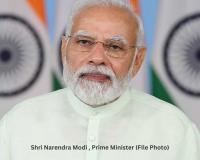Operation Sindoor Reflects India's New Era of Justice, Says PM Modi in Bikaner

Bikaner, May 22 — Referring to India’s military response to the recent terror attack in Pahalgam, Prime Minister Narendra Modi on Thursday declared that those who sought to "wipe out the vermilion" of Indian women were themselves reduced to dust. He described the retaliatory military operation as “Operation Sindoor,” a powerful symbol of India’s strength and resolve against terrorism.
As per agency report, Modi was addressing a public gathering in Palana, near Deshnok, during his visit to Rajasthan. He emphasized that the Indian armed forces, following the Pahalgam attack in April that claimed 26 lives, were given complete operational freedom. What followed, he said, was a precise and forceful retaliation that destroyed key terrorist infrastructure within minutes.
The Prime Minister stated that the 22-minute operation resulted in the demolition of nine major terror hideouts across Pakistan and Pakistan-occupied Kashmir (PoK). He added that India’s response was not merely driven by rage but was a new form of justice, reflecting a powerful and self-reliant India.
During his address, Modi asserted that India is no longer intimidated by threats of nuclear weapons and made it clear that there would be no trade or dialogue with Pakistan. The only subject for discussion, he said, would be Pakistan-occupied Kashmir. He also underlined a new three-pronged doctrine to combat terrorism: firm retaliation to any attack, no tolerance for nuclear intimidation, and treating terror groups and their state sponsors as one and the same.
Modi said the world, and India's enemies, had now witnessed what happens when “sindoor turns into firepower.” He noted that this was not about vengeance but about justice delivered through Indian strength.
The Prime Minister also touched upon the broader geopolitical implications of the operation, noting that Pakistan, having failed in direct wars against India, had long relied on terrorism as a proxy weapon. He warned that every terrorist attack now would come at a steep cost—borne by the Pakistani military and its fragile economy.
On the development front, Modi inaugurated and laid the foundation stones for various infrastructure projects worth over ₹26,000 crore. These included the redevelopment of Deshnok railway station under the Amrit Bharat Station Scheme and the flagging off of the Bikaner-Mumbai Express. He said these initiatives are part of a nationwide effort to modernize India’s infrastructure, with high-speed trains like Vande Bharat and Namo Bharat symbolizing the country’s new momentum.
Earlier in the day, Prime Minister Modi visited the revered Karni Mata Temple in Deshnok, where he offered prayers. He was accompanied by Rajasthan Governor Haribhau Bagde, Union Minister Arjun Ram Meghwal, and Chief Minister Bhajan Lal Sharma.
The visit, combining national security, infrastructure development, and cultural significance, aimed to reinforce the government’s narrative of a bold, modern, and spiritually grounded India.





